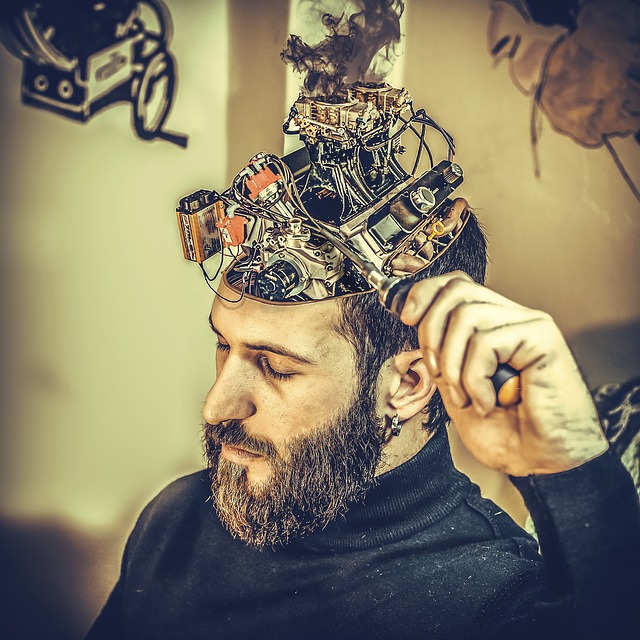 Submitted by The Mechanic on
Submitted by The Mechanic on

Image by aytuguluturk fromhttp://Pixabay.com
Are humans limited to the senses we’re born with? Or is it possible to hack the brain and create new senses? Even if we could, would we want more senses than we already have? This week we’re thinking about hacking the brain: perception beyond the five senses.
The idea of “hacking” the brain might sound a bit scary or sci-fi, but we’re not talking about brain chips or anything so invasive. What we are talking about is being able to add novel human senses, like a bat’s echolocation or a bird’s magnetoception (the ability to perceive magnetic fields). Wouldn’t that would be cool?
In a sense, we’ve already been hacking the brain in this way for a long time. Just think of the cane blind people use to see. It’s relatively simple technology and it doesn’t involve brain surgery to work, yet this is a simple way to hack the brain.
You might say that blind people don’t literally see with the cane. They navigate their environments with it, but that does not amount to seeing. The cane doesn’t give the blind person a sense perception they lack.
It’s true that a cane cannot endow a blind person with vision. However, we should not underestimate the power of the cane in the blind person’s hand. It’s more than just a mere navigation tool. As the phenomenologist Merleau-Ponty said, the cane gets “incorporated” into the blind person’s body. It becomes an extension of their hand. Maybe they can’t see the ground but they can literally feel it with the cane! The blind person’s brain is hacked, without any brain implant. All they needed was a simple cane.
But how does this constitute "hacking the brain"? It's hacking because the brain takes information from the cane and integrates it so seamlessly into experience that the cane starts to feel like part of the body, part of the perceptual system. Now, this might not sound very novel or exciting, if this is all I mean by “hacking” the brain, but the example of the cane was just to illustrate how technologically simple and unobtrusive this kind of hacking can be. The cane does not exhaust the possibilities.
Brain hacking technology doesn’t have to be very advanced. However, think about what could be achieved with today’s sophisticated technology. More advanced brain hacking technology has already been developed, so this is not just the stuff of sci-fi. For example, there are smart vests that allow not only blind people to see but also deaf people to hear using vibrations on their skin. And the same technology can be utilized to add novel human senses, not just those that most humans already have.
But the question remains. Can blind people really see with this vibrating vest? Can deaf people really hear? I already conceded that the blind person with a cane doesn’t literally see, so why would it be any different with a vest?
The difference is the amount of information you can get from the vest versus the cane. The only information the cane gives is what is on the ground in front of the person. It can tell you if there are obstacles or steps or other changes on the surface. The vest, on the other hand, provides much richer information of the environment. It uses a camera to translate visual information into vibrations, which creates a complex picture of the environment. In the case of the normally sighted person using their eyes to see and the blind person using the vest to see, roughly the same visual information is sent to the brain to be processed.
Of course, the brain itself doesn’t see, but the organism—the person—embodied in the right way with the right kind of perceptual apparatus hooked up to the brain in the right way, is what sees. The brain doesn’t care how it gets that information, and that’s why it can be hacked in this way. The vest essentially becomes a whole new sensory organ and just as the cane becomes seamlessly incorporated into the blind person’s body, so too does the vest.
As a person is learning to use the technology, whether cane or vest, they are aware of it as something external and unintegrated. But fairly quickly the technology becomes incorporated and fades into the background of experience. It’s like when you put on a pair of glasses. At first you might feel different and aware of something propped on the end of your nose. But quickly you stop noticing the glasses and only notice what you can now see with their aid.
Given the amazing possibilities, this technology is a very exciting development. It means those who lost or never had particular human senses will now be able to have them without expensive, invasive surgeries like cochlear implants. And it also means we can add novel human senses we never even imagined possible.
Perhaps now we will finally be able to answer that vexing question famously posed by philosopher Thomas Nagel—what is it like to be a bat?
Laura Maguire
- 406 reads